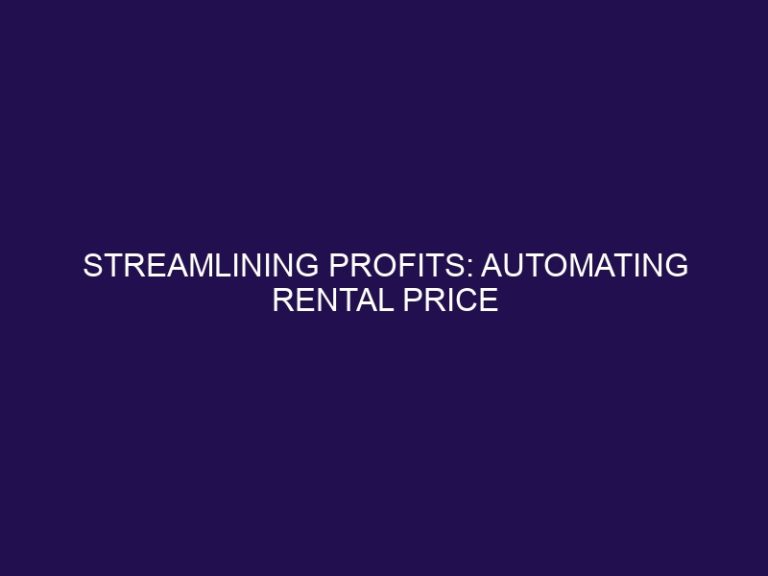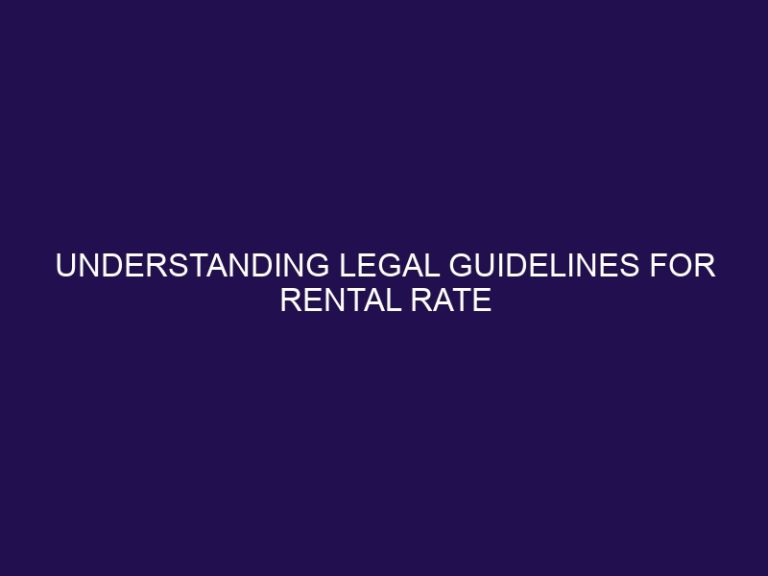What Information Is A Landlord Allowed to Ask For in Canada
As a landlord, it is essential to understand the rights and responsibilities that apply to both landlords and tenants in Canada. This knowledge enables you to create a fair and lawful rental process. One crucial aspect of this process is knowing what information you are allowed to ask for when screening potential tenants.
In Canada, landlords have the right to request certain information for the purpose of assessing a tenant’s suitability for the rental property. The information that landlords can legally ask for includes:
- Identification and Contact Information: It is reasonable for landlords to request the tenant’s full name, date of birth, and current contact information.
- Employment and Income Verification: Landlords can ask for proof of employment, such as pay stubs or a letter of employment, to ensure that the tenant has a stable income to afford the rent.
- Rental History: Landlords can inquire about the tenant’s previous rental history, including references from previous landlords, to assess their reliability as a tenant.
- References: It is acceptable for landlords to ask for personal references from individuals who are not family members. These references can provide insight into the tenant’s character and reliability.
- Credit Check: Landlords are permitted to request a credit check with the tenant’s consent to assess their financial responsibility and ability to fulfill rental obligations.
However, it is important to note that there are certain types of information that landlords are not allowed to ask for during the screening process. These include:
- Race, Ethnicity, or Nationality: Landlords cannot inquire about a tenant’s race, ethnicity, or nationality as it constitutes discrimination.
- Gender or Sexual Orientation: Questions related to a tenant’s gender or sexual orientation are prohibited, as this information is irrelevant to their ability to fulfill their rental obligations.
- Marital Status or Family Status: Inquiring about a tenant’s marital status, family status, or intentions to have children is considered discriminatory and is not permissible.
- Disabilities: Landlords cannot ask tenants about any disabilities or medical conditions they may have as it violates human rights laws protecting individuals with disabilities.
If a tenant encounters discriminatory information requests during the screening process, it is crucial to understand their rights. They should seek advice from local tenant advocacy organizations or legal professionals to address any discrimination issues and ensure a fair and lawful rental process.
What are the Rights and Responsibilities of Landlords and Tenants in Canada?
In Canada, both landlords and tenants have rights and responsibilities when it comes to rental agreements. It is crucial to understand what are the rights and responsibilities of landlords and tenants in Canada. Landlords are responsible for maintaining the property and ensuring tenants’ safety, while tenants have the right to a safe and habitable living environment. When it comes to the rental process, landlords can ask for information such as identification, employment verification, rental history, and references. However, it is important to note that they cannot ask for sensitive information like race, gender, or disabilities. If tenants encounter any discriminatory information requests, it is advised to report it to the appropriate authorities. Therefore, it is essential for both landlords and tenants to be knowledgeable about their rights and obligations under Canadian rental laws. One must bear in mind that in Canada, the rights and responsibilities of landlords and tenants are protected by provincial and territorial laws.
What Information Can Landlords Legally Ask For?
Curious about what information landlords can legally ask for in Canada? Let’s dive into the nitty-gritty of this important topic. In this section, we’ll uncover the specifics of what landlords are allowed to request from potential tenants. From identification and contact information to employment and income verification, rental history, references, and credit checks, we’ll explore the various aspects that come into play when it comes to gathering necessary information as a landlord. So, buckle up and let’s get informed!
Identification and Contact Information
“When landlords in Canada are gathering information from prospective tenants, they have the right to request Identification and Contact Information. This includes the tenant’s full name, date of birth, current address, phone number, and email address. Collecting this information is crucial for conducting background checks and staying in touch with the tenant throughout the application process. It is of utmost importance for landlords to follow privacy laws, such as the Personal Information Protection and Electronic Documents Act (PIPEDA), to ensure the secure handling of this information and prevent any discriminatory use. Properly gathering Identification and Contact Information is a fundamental aspect of the landlord-tenant relationship in Canada.”
Employment and Income Verification
Employment and income verification is an important aspect of the rental application process in Canada. Landlords are allowed to ask for certain information to ensure that tenants have the financial means to afford the rent. Here are some details that landlords can request:
- Employment Verification: Landlords can ask for proof of employment such as a letter from an employer or recent pay stubs.
- Income Verification: Landlords can request information about the tenant’s income to ensure that it meets the required income-to-rent ratio.
It is important for landlords to handle this information responsibly and in compliance with privacy laws to protect the tenant’s personal information.
Rental History
Rental history is an important factor in the landlord-tenant relationship in Canada. When considering potential tenants, landlords may ask for information regarding their rental history to assess their reliability as tenants.
- Previous rental references: Landlords may request contact information for previous landlords to inquire about the applicant’s rental behavior and adherence to lease agreements.
- Length of previous tenancies: Knowing the duration of past tenancies can give landlords an idea of a tenant’s stability and commitment to renting.
- Rental payment history: Landlords may inquire about the tenant’s payment history to ensure they have a track record of timely rent payments.
- Reason for leaving previous rentals: This information can provide insights into potential issues that may arise during the tenancy.
When providing rental history, it is important for tenants to be honest and accurate. Positive rental references can boost a tenant’s chances of securing desired rental units.
References
In the process of renting a property in Canada, landlords may ask for certain references from potential tenants. Here is a list of references that landlords are allowed to ask for in Canada:
- Rental Landlords may ask for references from previous landlords to assess the tenant’s past rental experience and behavior.
- Employment Landlords can request references from employers to verify the tenant’s income and employment stability.
- Personal Tenants can provide personal references from individuals who can vouch for their character, reliability, and trustworthiness.
- Credit Landlords may ask for credit references to assess the tenant’s financial history and ability to pay rent on time.
- Character Tenants can provide character references from people who can speak to their positive qualities and responsible behavior.
By considering these references, landlords can make informed decisions about selecting reliable and responsible tenants for their rental properties.
Credit Check
In Canada, landlords are legally allowed to conduct credit checks on potential tenants. This helps landlords assess a tenant’s financial responsibility and ability to pay rent on time. When requesting a credit check, landlords may ask for the following information:
- Full name and date of birth
- Social insurance number
- Current address
- Bank account number
- Credit references
- Rental history
It is important for landlords to obtain consent from tenants before conducting a credit check. Landlords must comply with privacy laws and handle personal information with care.
When requesting a credit check, landlords should:
- Clearly explain the purpose of the credit check
- Use a reputable credit reporting agency
- Follow all legal requirements and guidelines
- Keep personal information secure
What Information Can Landlords Not Ask For?
Wondering what information landlords in Canada are not allowed to ask for? Let’s dive into the intriguing sub-sections of race, ethnicity, or nationality, gender or sexual orientation, marital status or family status, and disabilities. Discover the legal boundaries and protections in place to ensure fair treatment when it comes to renting a property. Say goodbye to invasive questions and learn about your rights as a tenant in Canada.
Race, Ethnicity, or Nationality
Landlords in Canada are not allowed to ask for information about a tenant’s race, ethnicity, or nationality during the rental application process. This is because such questions can be seen as discriminatory and violate human rights codes. Landlords should focus on asking for necessary information like identification, employment verification, rental history, references, and credit checks. If tenants encounter discriminatory information requests, they should be aware of their rights and report the incident to the appropriate authorities. It is important for landlords to follow best practices and conduct due diligence in selecting tenants without indirectly discriminating based on race, ethnicity, or nationality.
Gender or Sexual Orientation
When renting a property in Canada, it is important to understand the rights and responsibilities of both landlords and tenants. Landlords are not permitted to inquire about an applicant’s gender or sexual orientation as it is considered a violation of human rights. According to the Ontario Human Rights Code, all individuals have the right to be free from discrimination based on these grounds. Landlords must focus on relevant information such as identification, employment verification, rental history, references, and credit checks. By adhering to these guidelines, landlords can ensure a fair and unbiased rental process for all prospective tenants.
Marital Status or Family Status
Marital status or family status is not a permissible question for landlords in Canada when collecting personal information from prospective tenants. The Ontario Human Rights Code explicitly prohibits discrimination based on these grounds. Landlords cannot refuse to rent to someone or treat them unfairly based on their marital status or family status. This protects individuals who are single, married, in a common-law relationship, divorced, separated, or have children. Landlords should focus on relevant information such as rental history, employment verification, and credit checks to assess a tenant’s suitability. By adhering to these guidelines, landlords can ensure a fair and non-discriminatory rental process.
Disabilities
When it comes to landlord-tenant relationships in Canada, it is important to know what information landlords are allowed to ask for, as well as what they are not allowed to ask for. Regarding disabilities, landlords are not allowed to ask for any information related to an individual’s disabilities. Here is a list of information landlords can ask for:
- Identification and contact information
- Employment and income verification
- Rental history
- References
- Credit check
True story: A tenant with disabilities once encountered a landlord who asked intrusive questions about their medical condition. This tenant promptly informed the landlord about their rights under the Ontario Human Rights Code and refused to answer any discriminatory questions. The landlord quickly realized their mistake and apologized. The tenant ultimately found a suitable rental unit and filed a complaint with the Human Rights Tribunal, educating the landlord about the importance of respecting tenants with disabilities.
What Should Tenants Do If They Encounter Discriminatory Information Requests?
What Should Tenants Do If They Encounter Discriminatory Information Requests?
When tenants encounter discriminatory information requests from landlords in Canada, what should they do? They should take appropriate action to protect their rights. Here are some steps tenants can take to address this issue:
- Familiarize yourself with your rights: Understand the laws and regulations that protect tenants from discrimination in Canada.
- Document the incident: If tenants encounter a discriminatory request, they should promptly write down the details, including dates, times, and any witnesses involved.
- Seek legal advice: It is advisable for tenants to consult with a lawyer or a tenant rights organization to understand their options and determine the best course of action.
- File a complaint: Tenants should report the incident to the appropriate housing authority or human rights commission in their province or territory.
- Keep records: To strengthen their case, tenants should maintain copies of any communication related to the incident, such as emails, letters, or messages exchanged with the landlord.
By following these steps, tenants can effectively deal with discriminatory information requests and ensure their rights are protected.
Frequently Asked Questions
What information can a landlord legally ask for in Canada?
In Canada, a landlord is allowed to ask for certain information on a rental application. This includes rental history, permission to run credit checks, and basic personal information such as name, address, and date of birth for conducting a credit check. Additional information like passport, driver’s license, employer, income, and expenses are not necessary for a credit check but can be requested for more detailed reports or to ensure the check is done on the correct person.
What information should landlords avoid asking for in Canada?
Landlords in Canada should avoid asking for sensitive personal information such as social insurance number, involvement in disputes with the Landlord and Tenant Board, or if they are on social assistance. Asking about age, disabilities, religion, sexual orientation, place of origin, family status, or gender expression is also considered personal and interferes with the tenant’s rights under the Ontario Human Rights Code.
Can landlords ask for a guarantor from prospective tenants?
Yes, landlords can ask for a guarantor if they are requesting one from other prospective tenants. A guarantor acts as a co-signer and provides an additional layer of financial security for the landlord in case the tenant fails to meet their rental obligations.
What are the best practices for collecting personal information from rental applicants?
Best practices for collecting personal information from rental applicants include limiting the collection, securely storing physical and electronic documents, properly disposing of information when no longer needed, and informing the applicant about the information being collected, its purpose, any third-party disclosures, and potential risks. It is important to respect the privacy and rights of potential tenants while ensuring compliance with privacy laws.
Can landlords conduct informal background checks on potential tenants?
Landlords can conduct informal background checks, such as interviewing other tenants, but this should be done with caution. It is important to respect the privacy of all parties involved and avoid discriminatory practices. To ensure a fair and unbiased selection process, it is recommended to focus on relevant information and avoid asking personal or sensitive questions.
Why is income information important for landlords in Canada?
Assessing a person’s income is crucial for landlords in determining whether they can sustain the tenancy and pay the rent in the long term. In Ontario, landlords are allowed to ask tenants about their income. This information helps landlords evaluate the financial fitness of rental candidates and make informed decisions during the tenant screening process.







